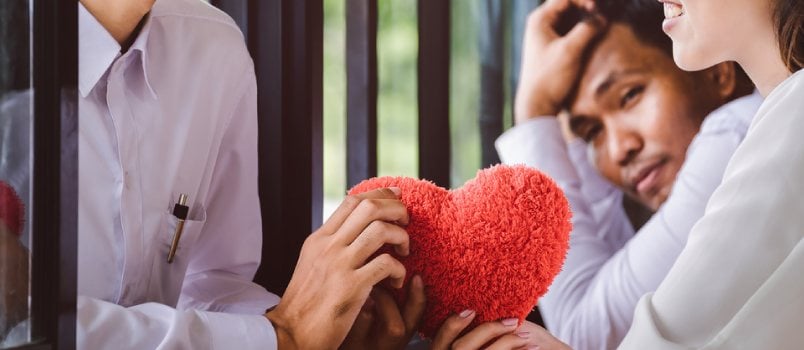What to Do When Your Love Is Marrying the Wrong Person

Heal & Grow Daily 30-Sec Tips for a Happier Relationship
👉 Subscribe FREEKey Takeaways
Marriage.com AI Quick Summary
Many of us have experienced someone we love, our brother, best friend, or favorite colleague, telling us they’ve met someone and they know, they just know, that this is “the one”.
When “the one” turns out to be loud or rude, or even makes a pass at us, when we remember why the “perfect” girl’s name is familiar (because she cheated on another friend) or when her “true love” turns out to be the guy who bullied a work colleague, what do we do next?
Maybe we just don’t like the person when we meet them and we wonder how someone we think so much of can marries a dud or worse.
Remember, you are walking on eggshells
It’s important to think carefully about the basis of your reactions as well as how to manage them, beginning with knowing you are in a classic no-win situation.
When someone is riding high on the chemicals of love, not only will they not believe you but might turn against you altogether.
Here are some important points to consider carefully.
1. Facts are important and should be shared
If you have factual information that someone is abusive, a cheat, or if you believe they might be a real threat to your friend’s health or well-being, it is important to speak up.
But do so carefully, and give facts without interpretation or critique of what you think it means. No matter how you say it, it could cost you the friendship, but if you don’t say anything, they may come back to you later, asking “How could you not have told me?”
It’s also simply unethical to not share information with someone if by not knowing it they may come to harm.
You might say something which validates their feelings and then asks what you should do. For example, “I really need your help because I don’t know what to do. I’m so happy you’re happy. I know you love so much about him and I want to support you.
It’s just that my sister knows the last girl he dated and said some things about him which makes me want to caution you; I’m concerned you could be in danger.” Then wait to see how your friend responds.
2. Facts are different from feelings, so distinguish between them
He may appear to be smug, loud, or just a nerd who you feel is below the partner you would choose. If you don’t like them because something about them rubs you the wrong way but you can’t pinpoint it, this is going to be much harder to communicate without damaging the friendship.
You’ve probably been quick to judge other people who turned out to be friends you learned to value and love; first judgments are often not the truth.
This would be a good time to find things that you do like about the new partner, things that don’t annoy you.
Remember, we can get stuck in “confirmation bias” when we make a judgment about someone and then everything they do acts to confirm our biased judgment.
Our open mind shuts down and we keep selecting things to prove to ourselves that we are right. Practice staying curious about your judgment rather than looking for ways to be right.
3. Don’t be pushy, let the conversation flow organically
If you sense your friend has second thoughts, don’t push the conversation, just wait for one to open.
If it comes and they share their doubts, don’t get too excited or dump all your judgments about them as this would likely push them to defend their lover. In other words, if you jump in and start trying to get your point of view across, you stop being safe and they close up.
However, if they see you as being there for them, they may feel safe enough to talk about their concerns.
Even then, go slow. “If you feel that way, have you thought about waiting a little longer before committing?” will come across a lot better than “I really don’t think it’s a good idea to carry on with the relationship. I don’t like him either.”
4. Remember this is their relationship
As a long-time marriage counselor and love coach, I can tell you we never know what goes on between two people nor can we see the whole story.
Someone who looks uncool may become the best partner we can imagine for our friend, while someone who seems super smooth may turn out to be narcissistic and too good to be true.
Most importantly it’s their choice, and even if you don’t like the choice, remember that you like them. So, lean into trusting them to know what’s right for them.
5. Know yourself well enough to know when it’s about you
Your reactions are often just that; about you rather than accurate perceptions of someone else.
Many of us have heard that we can only see what mirrors in someone else and sometimes we don’t like people when they remind us of that part of us we feel negative about.
Maybe they’re too judgmental, irritable, or needy; the very things you don’t like about yourself. Take your judgment a step further than believing its truth and ask what else the relationship triggers in you that may have little to do with the person.
Most of all, keep the lines of communication open.
If you stay open and your gut reaction proves to be true, you will be a safe person for your friend to come to when things go awry. If you stay open and your instincts prove not to be true, you may just have another person in your life to love.
You will also avoid the loss of a friend because you thought you knew best who they should love.
 Tips
Tips
Write your tip or submit a video tip
All tips are reviewed before the publishing.
Share this article on
Want to have a happier, healthier marriage?
If you feel disconnected or frustrated about the state of your marriage but want to avoid separation and/or divorce, the marriage.com course meant for married couples is an excellent resource to help you overcome the most challenging aspects of being married.
Related Articles
Recent Articles
Related Quizzes
Heal & Grow Daily 30-Sec Tips for a Happier, Healthier Relationship
👉 Subscribe FREE on YouTube We'd love your feedback!
We'd love your feedback!
 Expert Q&A
Expert Q&A
Ask your question related to this topic & get the support you deserve from experts.



















 Thanks for your feedback!
Thanks for your feedback!